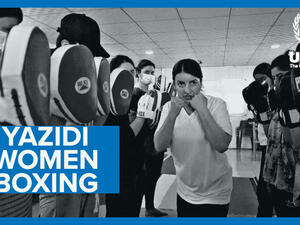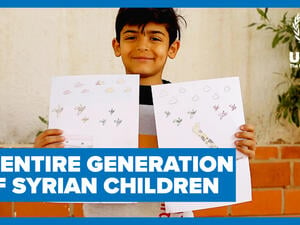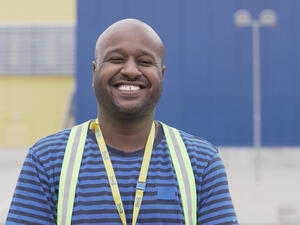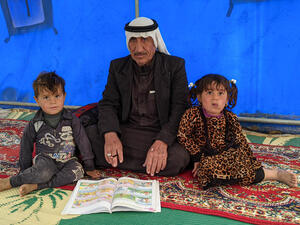Iraqi refugees cautious about return after landmark election
Iraqi refugees cautious about return after landmark election

A refugee far from home in Amman, Jordan.
BEIRUT, Lebanon, March 15 (UNHCR) - Early results from Iraq's national election, widely seen as a test of its democracy and a step towards stability after years of sectarian conflict, brought mixed reactions from Iraqi refugees still concerned about the situation back home.
Several Iraqi refugees said their country needs time to heal before they can safely return, while others said they were optimistic and many hoped the polls would end sectarianism and allow people to go home.
Many of the hundreds of thousands of Iraqi refugees living in Jordan, Syria, Lebanon and Egypt, said they voted in the March 7 election to help bring about change and stability. They were pleased that all parties in Iraq, reflecting the religious and political spectra, had participated, fuelling hopes for change.
Those who did not vote were sceptical that the ballot would bring about transformation. Iraq's independent electoral committee set up polling stations in several countries in the region to enable Iraqis overseas, including refugees, to vote. UNHCR provided support to the committee.
Among those still concerned about the situation were 60-year-old Hussein, who fled to Jordan in 2004. He said that if the government was formed by the same people who ruled Iraq over the past seven years, "then we expect a further worsening of the security situation in Iraq in general."
Refugee Zeinab voted from exile in Egypt but said she was pessimistic the election would end sectarian violence and lead to economic prosperity. "I will not return to Iraq. I can't return. I was persecuted and threatened there. I feel I'm still threatened. Even if the candidate I voted for wins, he can't prevent assaults against me," Zeinab said.
But Lamis, a 37-year-old mother of five was more sanguine. "We are optimistic about the election results, because they are the only thing we have hope in," she said. Haidar, 27, who fled to Syria to escape the violence in Iraq, was also more hopeful. He said the election results would influence his life and future. "The election will decide whether or not I can go back to Iraq," he said.
Voter turnout was 62 per cent of Iraq's population despite violence that claimed the lives of 39 people on election day. Final results of the vote, the second since the 2003 ouster of President Saddam Hussein by a US-led military coalition, will take days to announce.
Preliminary results showed a tight race between the Shiite-Sunni coalition led by Prime Minister Nouri al-Maliki and secular challenger Ayad Allawi. No bloc, however, was expected to gain a majority and negotiations to form a government could take months.
Many Iraqi refugees said they were worried that these negotiations might increase tension and stoke violence.
"Change is not easy," said Nadia, a pharmacist who fled to Egypt. "It will take time for the current situation to change and improve," she added.
Many of the Iraqis who fled overseas endure harsh living conditions and indignity as refugees and asylum-seekers. Some hope for resettlement in third countries. For them, the improved security situation in some parts of Iraq is not enough to persuade them to return. UNHCR is not promoting returns of refugees to Iraq and the refugee agency firmly opposes forced returns of persons of concern who are fearful for their safety.
Hassan, an Iraqi refugee in Lebanon, echoed the thoughts of many of his compatriots when he said he hoped the election would end sectarianism and assist the "return of displaced Iraqis and refugees to their homes."
By Wafa Amr and Laure Chedrawi in Beirut, Lebanon; Farah Dakhllalah and Dalia al-Achi in Damascus, Syria; Dana Bajjali in Amman, Jordan; and Najlaa Abdelbarry in Cairo, Egypt








